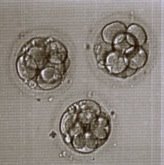Standing next to Bush were families that had 'adopted' frozen embryos from in vitro fertilization (IVF) clinics, embryos that were now the smiling children in the photo op. This setup up reinforced what I think is an extreme ethical view, a view that Bush was trying to convey at this event: that frozen embryos comprised of a handful of cells are morally equivalent to the breathing, smiling children in the photo op. Killing an embryo is no more acceptable than killing one of those children.
This position is absurd. If it is true, than I have been complicit in murder, because my wife and I have gone through two rounds of IVF.
Most people don't really know how IVF is practiced - there is a misconception that left over embryos are generally frozen, and that thus there are a lot of embryos that could be saved for, say, embryo adoption. In fact, in most IVF cycles, embryos that are not immediately used are discarded. They are only frozen if the couple wants to save some for future use, and then you have to pay to have the embryos stored for you. There are a lot of frozen embryos out there, but even more are discarded every day.
We didn't choose to freeze embryos. In our first round of IVF, we used only one, and thus several others were discarded. In our second round, we had three embryos implanted, and others were discarded. Of those three that we used, two worked.
How can anyone think that the death of one of these:

Is morally equivalent to the death of one of these:

(In case you can't see the obvious resemblance, yes, two of those three embryos in that picture eventually became our twins.)
By Bush's moral reasoning, we ended a lot of human lives to get our two dear girls. (Actually, we have three - the twins have an older sister, who was not conceived through IVF.) I haven't shed tear over the lost embryos. What human being really would? When it comes to the lives of our twins, obviously I feel much, much differently. Anyone who argues that their lives are equal to those of the lost embryos is just chasing abstractions, engaging in abstract moral reasoning that is completely severed from real human experience.
Part II: Is stem cell research really that important?
As a father of girls conceived through IVF, I think Bush's moral reasoning is absurd. As a biologist, I know there are strong scientific reasons for studying stem cells. Most of the scientific reasons the public hears about are reasons relating to relatively short term medical cures. I'm going to talk about the more fundamental scientific reasons. I think it is this fundamental science that will lead to the truly spectacular cures of the future.
The cloned sheep Dolly demonstrated a remarkable biological phenomenon. We can take the genome of an adult differentiated cell - a cell that ceased dividing, and that has shut off a huge proportion of its genes, ones not required for the specialized function of that adult cell - and we can get that genome reprogrammed so that it can direct the formation of any type of cell in the animal. The big problem is that we have no idea how this happens. We don't know the molecular details - what proteins are involved, what genes get turned on and off, and in what order this occurs.
Understanding this process would have a huge impact on biology - from the cell division cycle (related to our ability to prevent and treat cancer) to development (getting from an embryo to an adult organism). It's hard to imagine a disease whose treatment would not be affected by a thorough understanding of this process.
To understand the molecular details of genome reprogramming, we have to study embryonic stem cells. (While these cells themselves aren't being reprogrammed in the way the cell that gave rise to Dolly was, they are good tools for studying the molecular pathways that are likely involved.) Much of the basic research can currently be done in rat or mouse embryonic stem cells, but we'll need to use human cell lines as well. The experiments to study the molecular details of reprogramming are hard enough with the right resources. Limiting those resources, as Bush has done, makes this research that much harder, at least in the US.
Scientists somewhere are going to figure out genome reprogramming, and the results will overhaul our ability to treat many currently intractable diseases. Dubious ethical reasoning may ensure that those scientists won't be working in the US.
For more: Check out this lab which works on adult stem cells. The research description at the bottom of the page discusses some of the promise of stem cell research.




No comments:
Post a Comment